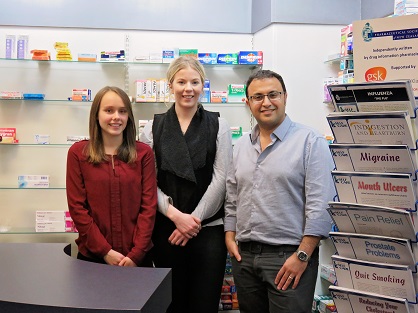
What do pharmacists expect from their interns? Final-year students Ashley Cronin (left) and Olivia Coe, together with their peers and lecturers Hesham Al-Sallami (pictured) and Alesha Smith, have developed a survey to find some answers to that question.
“It will be quite interesting to see what pharmacists think we should know and compare it to what we actually know,” student Olivia Coe
Final-year students Ashley Cronin and Olivia Coe are intrigued to discover what the results from their elective research project will reveal.
The pair have helped develop a survey to find out what pharmacists expect from their new interns - in terms of their ability to perform certain professional activities such as medicine therapy assessments and anti-coagulant management.
“It will be quite interesting to see what pharmacists think we should know and compare it to what we actually know,” Olivia says.
The two fourth-year students are carrying out the research project together with four other final-year students – Anita de Borst, Ashleigh Dick, Michelle Quin and Rachel Voss. Lecturer in clinical pharmacy, Hesham Al-Sallami, is supervising the students together with senior lecturer in clinical pharmacy, Alesha Smith.
Dr Smith has helped them develop a survey which has been distributed to 150 pharmacies around the country asking them to rank their expectations of intern competence against 19 professional activities.
The information will be used to help inform development of the school's new curriculum, which is currently under review. One aspect of the review is to look at specialised services that pharmacists will increasingly carry out in the future such as offering vaccines.
Dr Al-Sallami explains such activities are termed “entrustable professional activities” (EPAs). The school is investigating the use of EPAs in pharmacy teaching and training.
EPAs have existed in medical teaching for some time and now a few pharmacy programmes in the US and elsewhere have started looking into the area.
“We are trying to align what is expected by the Pharmacy Council of New Zealand in the pharmacists' scope of practice to what we teach at the undergraduate level,” Dr Al-Sallami says.
“Once implemented the school will be one of the first in the world to incorporate EPAs fully into the pharmacy programme.”
The students are finding the project a valuable learning experience. Ashley explains undertaking research is a new skill for her and her peers and, while they have had lectures about undertaking research, this was the first time they had been able to put their skills into a practical situation.
Initially all six of the students were attempting to do everything together, but they found it was easier for smaller groups to take over different aspects of the survey's development, sharing results of their work with the others for feedback.
Now, they are sitting back and waiting in anticipation to learn what pharmacists expect of them next year when they begin their internships.
Article written by Liane Topham-Kindley for Pharmacy Today, August 2016
